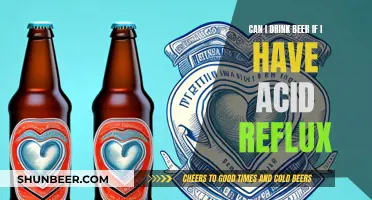
The term beer belly is a misnomer, as it's not exclusively caused by beer. However, alcohol consumption is associated with weight gain, and the high-calorie content in alcoholic drinks can lead to increased belly fat. So, will your beer belly go away if you stop drinking? The answer is yes, but it will take a combination of diet and exercise, and it may take longer to lose the weight than it did to gain it.
| Characteristics | Values |
|---|---|
| Will a beer belly go away when you stop drinking? | Yes, but it will take a combination of diet and exercise. |
| Why do beer bellies form? | Alcohol consumption is associated with abdominal obesity. |
| How does alcohol cause weight gain? | Alcohol has a high calorie content, stimulates appetite, and interferes with fat-burning. |
| Who is more prone to beer bellies? | Men are more prone to beer bellies due to differences in metabolism and hormones. However, women can also develop beer bellies, especially after menopause. |
| Health risks of a beer belly | Increased risk of heart disease, type 2 diabetes, high blood pressure, cardiovascular disease, and certain cancers. |
| Tips to reduce a beer belly | Cut back on alcohol, make healthier food choices, and increase physical activity. |
What You'll Learn
- Alcohol stimulates your appetite, leading to increased food consumption
- Alcohol impairs judgement, leading to less healthy food choices
- Alcohol interferes with the body's ability to burn fat
- Alcohol is high in calories
- Reducing alcohol intake and combining strength and cardio fitness programmes can help reduce a beer belly

Alcohol stimulates your appetite, leading to increased food consumption
Alcohol can stimulate your appetite, leading to increased food consumption and potentially contributing to weight gain. This phenomenon has been observed in studies on both animals and humans. For example, a study on mice found that alcohol activated brain signals that triggered a greater intake of food. Similarly, a review of eight studies on humans showed that alcohol led to a significant increase in energy intake in three of the studies.
There are several possible reasons why alcohol may stimulate appetite. One theory is that alcohol lowers inhibitions, making it harder to control portion sizes and resist unhealthy snacks. Alcohol can also influence hormones that affect feelings of fullness and satiety, such as leptin and glucagon-like peptide-1 (GLP-1). By inhibiting these hormones, alcohol may disrupt the body's ability to recognize when it has had enough to eat.
Another mechanism could be alcohol's effect on the brain's hypothalamus. Specifically, alcohol may stimulate nerve cells in this region that are typically activated during starvation, leading to an intense feeling of hunger and increased appetite. This neuronal response may explain why people tend to eat more when they have been drinking.
The high-calorie content of alcohol itself also contributes to weight gain. A large glass of wine, for example, can contain as many calories as a doughnut. Additionally, alcoholic drinks are often accompanied by high-fat, high-calorie foods, such as pizza, nachos, or cheese. This combination of alcohol and unhealthy food choices can further exacerbate weight gain.
To counteract the appetite-stimulating effects of alcohol, it is recommended to drink with a balanced meal that includes whole grains, complex carbohydrates, healthy fats, and protein. This can help ensure that any increased appetite is not due to actual hunger. It is also important to avoid having unhealthy snacks within easy reach and to opt for healthier alternatives like hummus with chopped vegetables or air-popped popcorn. Staying hydrated with water instead of reaching for another drink can also help curb alcohol munchies.
Beer and Wisdom Teeth: Safe Drinking Timeline?
You may want to see also

Alcohol impairs judgement, leading to less healthy food choices
Alcohol impairs judgement and can lead to poor outcomes for one's health. Research has shown that alcohol can affect an individual's decision-making processes, leading them to engage in behaviours they would not consider when sober. This can include an increased tendency to engage in violent or aggressive behaviours, risky sexual behaviours, and impaired coordination and ability to multitask.
Alcohol's impact on judgement can also lead to less healthy food choices. For example, young adults have been found to trade off between healthy and unhealthy behaviours, such as engaging in physical activity to compensate for binge drinking or unhealthy eating. Alcohol consumption can also lead to a reduction in physical activity, as individuals may lack the motivation or energy to exercise after drinking.
Additionally, alcohol can interfere with the body's ability to burn fat efficiently. The body prioritises breaking down alcohol for energy before it gets to stored fat. This can contribute to weight gain and the formation of a "beer belly".
Furthermore, alcohol is often consumed alongside high-fat, high-calorie foods. The combination of alcohol and unhealthy dietary choices can further exacerbate weight gain and negatively impact overall health.
To improve health and reduce the risk of weight-related issues, it is important to address both alcohol consumption and dietary choices. Cutting back on alcohol intake and making healthier food choices can help reduce the negative impacts on the body and support weight loss or weight maintenance.
Japanese Beer Cups: The Science Behind the Froth
You may want to see also

Alcohol interferes with the body's ability to burn fat
Alcohol can interfere with the body's ability to burn fat in several ways. Firstly, alcohol is calorie-dense, and as a result, the body is more inclined to metabolise it first before turning to other energy sources like stored fat. This process can take up to 36 hours, significantly slowing down the body's fat-burning mechanisms.
Secondly, alcohol consumption can lead to increased cravings for food, especially those high in sugar and salt. As the body metabolises alcohol, blood sugar levels drop, causing an increase in appetite. This can lead to overeating or opting for unhealthier food choices, which provide additional calories that the body must process before returning to burning fat.
Additionally, drinking alcohol can reduce motivation for physical activity, further hindering weight loss efforts. The combination of increased calorie intake and decreased physical activity can contribute to weight gain and interfere with fat-burning processes.
While the relationship between alcohol consumption and weight gain is complex, with varying results from different studies, it is generally agreed that drinking higher-than-moderate amounts of alcohol can negatively impact weight loss attempts. Alcohol not only adds empty calories to daily intake but also disrupts the body's metabolic pathways, making it more challenging to burn fat efficiently.
To summarise, alcohol can interfere with the body's ability to burn fat by disrupting normal metabolic processes, increasing food cravings, and reducing motivation for physical activity. These factors collectively contribute to a slowdown in fat burning and can lead to weight gain if not managed appropriately.
Beer and Metformin: Is It Safe to Mix?
You may want to see also

Alcohol is high in calories
The calorie content varies across different types of alcoholic drinks. For example, a pint of lager has a similar calorie count to a standard slice of pizza, and a large glass of wine (250ml) contains approximately the same number of calories as a typical ice cream sundae. A bottle of white wine (12.5%, 750ml) provides 564 calories, while a six-pack of cider (4.5%, 500ml cans) adds up to 1,260 calories over the course of a week.
The impact of alcohol on weight gain is not limited to its calorie content. Alcohol also interferes with the body's ability to burn fat efficiently. When alcohol is present in the body, it prioritises getting rid of the toxic substance, disrupting the absorption of nutrients and the processing of fat. This can lead to increased fat storage around the middle, contributing to the formation of a "beer belly."
Additionally, alcohol often contains a significant amount of sugar, further increasing the calorie intake. Mixers, such as soft drinks, also add extra calories and sugar to the drink. Liqueurs, sweet wines, alcopops, and cider are known for their high sugar content.
To maintain a healthy weight, it is important to be mindful of alcohol consumption. Reducing alcohol intake or choosing lower-calorie options, such as light beer, wine spritzers, or mixed drinks with low-calorie mixers, can help in weight management while still allowing for moderate alcohol consumption.
Beer Drinking and Weight Gain: Daily Habit's Impact
You may want to see also

Reducing alcohol intake and combining strength and cardio fitness programmes can help reduce a beer belly
The term "beer belly" is a misnomer, as it's not exclusively caused by beer or alcohol consumption. However, alcohol does contribute to weight gain, and reducing your intake can help address this issue. Alcohol contains almost as many calories as pure fat, with a typical beer containing 150 calories and a pint of lager containing 180 calories. Additionally, alcoholic drinks are often accompanied by high-calorie foods, and alcohol stimulates appetite and impairs judgment, leading to less healthy food choices.
To reduce a beer belly, it is important to cut back on alcohol consumption and make healthier dietary choices. This includes reducing portion sizes, increasing fruit and vegetable intake, and opting for whole grains and lean proteins over processed foods and added sugars.
In addition to dietary changes, combining strength and cardio fitness programs is crucial for effective weight loss and reducing a beer belly. High-intensity intermittent exercise (HIIE) has been found to be particularly beneficial for burning fat and accelerating weight loss. Aim for at least 30 minutes of moderate-intensity aerobic exercise most days of the week, along with strength training and stretching.
It is important to note that there is no quick fix or magic formula for losing weight and reducing a beer belly. Consistent attention to a balanced diet, appropriate portions, and regular physical activity are key. Additionally, visceral fat, which is associated with a higher risk of health problems, can be broken down quicker than other types of body fat, so reducing a beer belly can have noticeable results.
Morning Beer: Should You Drink Before Work?
You may want to see also
Frequently asked questions
Beer bellies are caused by consuming too many calories, whether from alcohol, sugary beverages, or oversized portions of food. Alcohol stimulates your appetite and can cause you to eat more than you usually would. Beer also contains a high number of calories, with a typical beer containing 150 calories.
To get rid of a beer belly, you need to lose weight. This can be achieved by eating a healthy, reduced-calorie diet and exercising regularly. Lower-calorie beers, non-alcoholic beers, and mocktails can also help.
Yes, having a beer belly can increase your risk of developing health problems, including heart disease, type 2 diabetes, stroke, and certain cancers.







